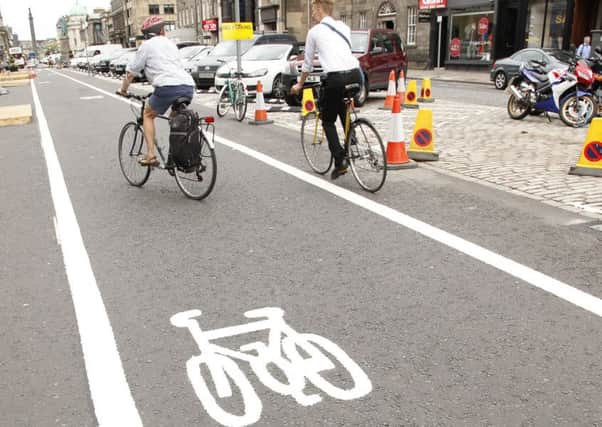City ‘needs more cycle lanes and faster buses’


They also want to see more investment in low-carbon homes, low-energy lighting and a drive to develop local food and produce as a key asset of the region.
Edinburgh has linked up with the other Lothian councils, as well as Fife and Borders, to put together a bid for UK and Scottish Government funding to boost the area’s economy under a city region deal. Specific projects have yet to be spelled out.
Advertisement
Hide AdAdvertisement
Hide AdBut Councillor Gavin Corbett, the Greens’ economy spokesman in Edinburgh, said a city region deal had to be a “green” deal rather than a “business as usual” package.
He said: “The City Deal needs to be a Green City Deal – to be part of the programme DNA. The major investment needs to be in the kinds of projects which will grow the kind of economy we need in the next 20-30 years, not rooted in the past – driving a new deal for transport, improving local food markets, making us less energy reliant, and so on.”
He said he would like to see cycle “superhighways” – long-distance dedicated cycle lanes – from the nearer parts of East Lothian, Midlothian and West Lothian into Edinburgh.
“In Copenhagen these have saved a million lost sick days due to improved health, so cycle routes are a part of economic investment,” he said.
Improved bus journey times, particularly from Fife and the Borders, should be another aim of the package, he said, along with further investment in eco-buses.
And he proposed decentralised “work hubs” in places such as Haddington, Broxburn and Penicuik where people could hire a desk or meeting space to reduce the need for commuting.
Councillor Corbett said the city region deal should also develop local food and produce as a key asset, connecting farms in the area with big retailers. “At the moment, you’re as likely to be buying carrots from Kent as from East Lothian.”
He said a focus on low-carbon housing had been a key part of the city deal secured by Manchester, requiring higher energy performance standards in all new buildings. And he argued Edinburgh should follow suit, as well as investing in district heating networks – where homes, schools and offices in an area share a boiler rather than each operating their own – and scaling up the use of low-energy lighting, currently a pilot project in certain areas of the Capital.
Advertisement
Hide AdAdvertisement
Hide AdBut Cllr Corbett said with deals already agreed for Glasgow and other cities across the UK, Edinburgh had to offer something different to stand out in a crowded field.
In a letter to the Evening News he said: “It is not enough to pledge increased tax returns on the back of increased economic activity (the core premise of city deals).
“Nor is it sufficient to talk about the ‘knowledge economy’ or to aspire to reduce inequality, absolutely critical though that is.”
He argued that to be genuinely pioneering, the bid for a city region deal should be about a sustainable economy – reducing traffic strains, increasing energy resilience, harnessing local markets and produce and investing in “breathable” public spaces.
The six councils involved in the Edinburgh city region deal are expected to submit their detailed proposals to the UK government early next month.